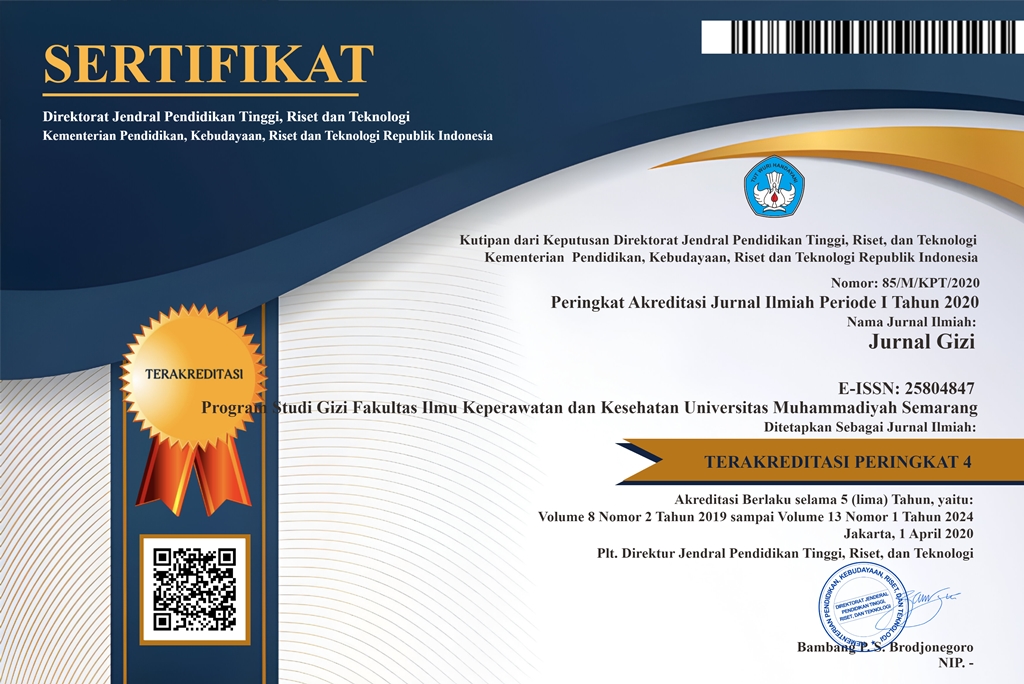FORMULASI BEKATUL, IKAN GABUS DAN TEPUNG KEDELE (SOYA BUSTUL) UNTUK LANSIA
(1) Program Studi Sarjana Terapan Gizi dan Dietetika Poltekkes Kemenkes Palembang
(2) Program Studi Sarjana Terapan Gizi dan Dietetika Poltekkes Kemenkes Palembang
(3) Program Studi Sarjana Terapan Gizi dan Dietetika Poltekkes Kemenkes Palembang
(4) Program Studi Sarjana Terapan Gizi dan Dietetika Poltekkes Kemenkes Palembang
(5) Program Studi Sarjana Terapan Gizi dan Dietetika Poltekkes Kemenkes Palembang
(6) Program Studi Sarjana Terapan Gizi dan Dietetika Poltekkes Kemenkes Palembang
(*) Corresponding Author
Abstract
Malnutrition in older people is brought on by a number of circumstances, including dental
issues that restrict food intake. Due to the strong connection between this issue and the
nutritional status of the old, it requires careful consideration. As a result, new food products
that are simple for the elderly to consume but provide a balanced diet are required. This study
is an experimental one conducted in a lab setting with three different treatments and a
completely randomized design. The Food Technology Science Laboratory of the Nutrition
Department of the Health Polytechnic of the Ministry of Health Palembang prepared the Soya
Bustul healthy drink and conducted organoleptic tests there, while the Proximate Analysis test
was conducted at the Food Technology Laboratory, Sriwijaya University, Palembang. The
panelists enjoyed the taste, aroma, texture, and color of the F1 treatment with the addition of
25 grams of rice bran, 30 grams of snakehead fish meal, and 35 grams of soybean flour,
according to the results of the organoleptic test using the hedonic scale. The overall
acceptability of Soya Bustul is more despised the more snakehead fish meal, rice bran, and
soybean flour are added. The overall look of color, scent, taste, and texture has an impact on
this circumstance. The finest Soya Bustul beverage formulation has proximate analysis values
of 5.20 percent fiber, 75.52% water, 1.10 percent ash, 3.72 percent fat, 5.84 percent protein,
and 13.82 percent carbohydrates.
Keyword : Elderly, Soybean, Snakehead Fish, Bran
issues that restrict food intake. Due to the strong connection between this issue and the
nutritional status of the old, it requires careful consideration. As a result, new food products
that are simple for the elderly to consume but provide a balanced diet are required. This study
is an experimental one conducted in a lab setting with three different treatments and a
completely randomized design. The Food Technology Science Laboratory of the Nutrition
Department of the Health Polytechnic of the Ministry of Health Palembang prepared the Soya
Bustul healthy drink and conducted organoleptic tests there, while the Proximate Analysis test
was conducted at the Food Technology Laboratory, Sriwijaya University, Palembang. The
panelists enjoyed the taste, aroma, texture, and color of the F1 treatment with the addition of
25 grams of rice bran, 30 grams of snakehead fish meal, and 35 grams of soybean flour,
according to the results of the organoleptic test using the hedonic scale. The overall
acceptability of Soya Bustul is more despised the more snakehead fish meal, rice bran, and
soybean flour are added. The overall look of color, scent, taste, and texture has an impact on
this circumstance. The finest Soya Bustul beverage formulation has proximate analysis values
of 5.20 percent fiber, 75.52% water, 1.10 percent ash, 3.72 percent fat, 5.84 percent protein,
and 13.82 percent carbohydrates.
Keyword : Elderly, Soybean, Snakehead Fish, Bran
Full Text:
PDFArticle Metrics
Abstract view : 292 timesPDF - 56 times
DOI: https://doi.org/10.26714/jg.11.2.2022.96-104
Refbacks
- There are currently no refbacks.

This work is licensed under a Creative Commons Attribution 4.0 International License.
Diterbitkan oleh: Program Studi Gizi (D3 dan S1)
Fakultas Ilmu Keperawatan dan Kesehatan
Universitas Muhammadiyah Semarang
Sekretariat: Jl. Kedungmundu Raya No. 18 Semarang
Contact Person : Hapsari Sulistya Kusuma, S.Gz, M.Si (+62 85 6 41 536 553)

This work is licensed under a Creative Commons Attribution 4.0 International License.










.png)
.png)
_.png)